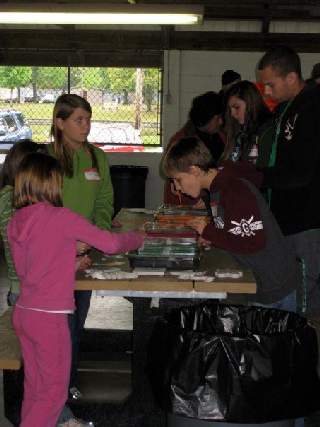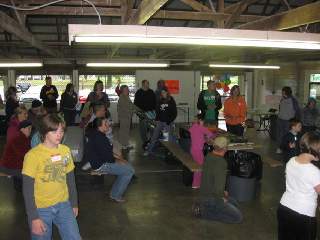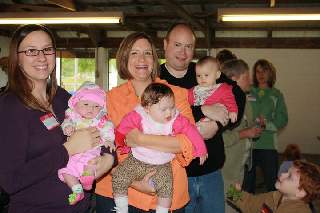|
|
The Riverbend Down Syndrome Association is a 501(c)(3) non-profit organization and can receive tax deductible contributions. Our Employer Identification Number is: 14-1982424.
- A warm welcome is extended to the following families to the Riverbend Down Syndrome Association:
Garet and Cori Bair – (McKenna: 7/30/2002)- Brian and Kim Burlison – (Nicholas: 7/28/2008)
- Matt and Heather Causey – (William: 8/3/2009)
- Walter and Karrie Heck – (Ethan Alexander: 5/20/1996)
- Bob and Stephanie Jordan – (Chris: 1987)
- Issac Kim – (Sunny: 2/23/1968)
- Travis and Christina Lyday – (Owen: 10/1/2009)
- Scott and Gina Miller – (Morgan: 6/2/2008)
- Scott and Richelle Norvell – (Reid: 1/5/2005)
- Tim and Juliana Pickford – (Laurellen: 7/22/1992)
- Randy and Patty Sprague – (Tabitha Thompson: 8/23/1995)
Parent Support Meeting
The Riverbend Down Syndrome Association meets at 6:30 p.m. on the 4th Monday of each month at LeClaire Christian Church, 1914 Esic Drive, Edwardsville, IL 62025. Our next meeting is January 24, 2011. Contact: Sara Schwarz and Tammy Wrobbel at: support@riverbendds.org.
Notes from the October Parent Support Meeting
The guest speaker was Mr. Jim Haney, Administrator, with DD Homes Network. Mr. Haney provided information about adult living options and discussed how a residence facility is physically set up, funded, and what kinds of activities the residents participate in. If interested in obtaining a DVD providing a visual tour of one of the facilities, please call Tammy at (618) 830-6562. He also invited caregivers to tour a facility. Contact: 1450 Virginia Avenue, Wood River, IL 62095. (618) 259-2777, cell: (618) 363-2442. www.ddhomes.net.
Notes from the November Parent Support Meeting
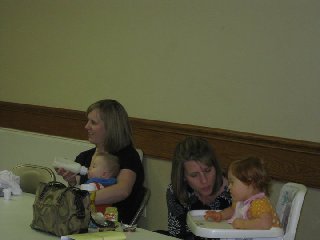 |
| Christy Lyday with Owen & Gina Miller with Morgan listening to Dr. Robert Clipper. |
|
 |
Dr. Robert Clipper, licensed marriage and family therapist, a practicing counselor in the area for over 33 years, discussed the importance of communication in a relationship, particularly after been given a diagnosis for your child and talked about how emotions evolve and the importance of learning, growing, appreciating and respecting your partner. He reminded us that often men and women handle the news differently. We also talked about how siblings and friends deal with the news and how we, as parents, relay the information about the diagnosis to others. His office is located at 1669 Windham Way #B, O'Fallon, IL 62269. (618) 622-2579, www.casicounseling.org.
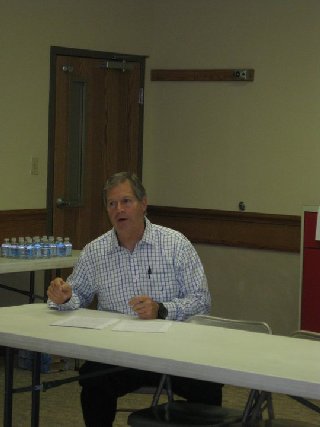 |
| Dr. Clipper discussed likely struggles that couples go through when having a child with special needs. He also discussed some basic things that couples can do to maintain a healthy relationship when having this added stressor. |
|
|
|
Local Events
Jensen-Schmidt Tennis Academy for Down Syndrome Winter training in cardio, weights, balance and tennis. Mission: The Jensen-Schmidt Tennis Academy has been established and designed to meet the sport specific needs of children and young adults with Down syndrome.
- Saturday 2011 Dates: January 8, 15, 22 & 29
- Time: 4:00 to 5:30 p.m.
- Location: Creve Coeur Racket Club - Conway Road
- Contact Vince Schmidt (314) 606-3639, E-mail: js10s@hotmail.com
- URL: http://jensen-schmidt.com
Riverbend Fall Picnic Photographs
See more picnic photos on our Facebook page.
Puttin' for Down Syndrome 6th Annual Charity Golf Event by Tim Nienhaus
Thanks to everyone who participated in the 6th Annual Golf Tournament, Silent Auction, and Free Golf Clinic this year. Special thanks goes out to Dan Polites, the golf pro and clinic instructor, and the staff of Clinton Hill Golf Course for making the event run smoothly and for going the extra mile to make it a special event for everyone. The event was a huge success. We had 119 golfers at the event and 7 individuals in the golf clinic. Several families joined us for dinner after the event and participated in the silent auction. Fred Bird made an appearance at the golf clinic and everyone had a great time. This turned out to be our best event to date. For the event we netted just over $10,000 that will be donated to the Down Syndrome Clinic at St. Louis Children's Hospital and the Down Syndrome Association of Greater St. Louis.
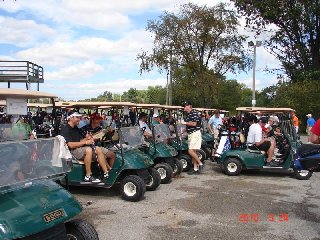 |
|
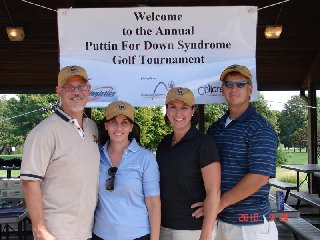 |
| Shutgun start |
|
From left: Tim & Cheri Nienhaus, Ann & Dan Sutter |
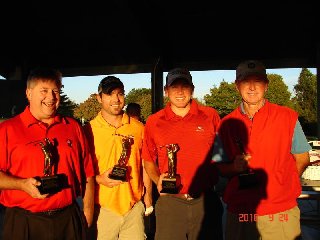 |
|
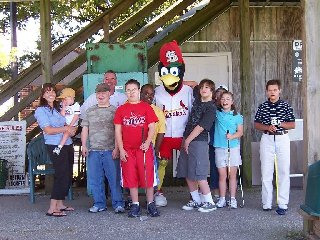 |
| From left: Chris Scheer, Corey Scheipter, Joe Sharamitano, Carl Benbrooke |
|
From left: Cheri & Alex Nienhaus, Nick Schaab, Dan Polites, Aaron Mitchell, Montay Roberts, Fredbird, Shawen Rampold, Emily Kramer, Maddie Harnar, Emmanuel Bishop |
Additonal event photographs on Facebook or search for "Puttin For Down Syndrome" and become a friend.
Down Syndrome Articles
The 2010 National Down Syndrome Congress Convention by Sherry Skramstad, E-mail: sskramstad@gmail.com. © 2010 Sherry Skramstad.
Upon arriving at the National Down Syndrome Congress (NDSC) convention in Orlando, FL, I first visited the exhibitors' tables to see what was available and what types of books were offered for sale, as compared to mine. I met Dr. Brian Skotko, whose research I quoted in my book, as well as Mary Perry, who wrote a book similar to mine, about her older brother who had Down syndrome and how she and her family grew up on a farm in Alaska, also in the mid 1940s.
I then attended the first ever Adult Siblings Only workshop. Adult siblings of people with Down syndrome have much to ponder and share. The workshop was informative and I met others who sought answers to many of the questions I had earlier in my life.
Especially important to me was legal information about the difference in having a family member declared incompetent versus having only the power of attorney for them, with an eye specifically to their medical treatment. I found out, much to my chagrin, that I could have challenged my stepfather in regard to not allowing doctors to find out why my sister couldn't swallow and removing her from the hospital to die. Her subsequent death might not have been prevented, but it might have allowed her to live longer and not to have died of dehydration and starvation.
At the opening Welcome Session, I was seduced by the beautiful and accomplished self advocate speaker, Patricia Moody, who also signed while she spoke, and informed us that the 2,200 attendees to the convention represented the largest congregation of people with Down syndrome and their family members on the history of the world.
I cried at several points throughout the convention: for my sister, who might have accomplished so much more had she only been born thirty years later; and for my mother, who died in April, without ever being apprised of the heights to which many with Down syndrome had risen. After spending her life raising funds for the developmentally disabled in New York and Florida, and building several community residences and a sheltered workshop, I only wished she had lived long enough for me to share with her my discoveries from the NDSC convention.
When Aaron Anderson, one of three self advocates to speak on the keynote address of "We're More Alike than Different", as a former special educator for thirty-two years, I could only marvel at how well his speech had been crafted. Mr. Anderson aspires to gain enough signatures on his petition to run for governor in his home state of Iowa. At the end of his speech, the entire audience gave him a ten minute standing ovation.
The evening concluded with a self advocate DJ, named Pete Asplundh, who played records for the "Just Dance" theme that the NDSC hopes all attendees will take back home and host a dance that will raise Down syndrome awareness.
On Saturday I attended Dr. Skotko's workshop on "Sibling Issues" targeted for younger siblings. He and a colleague gave information on the research they have done which I had previously read. Dr. Skotko is the older sibling of a young woman with Down syndrome.
It was in that workshop that I began to discern a difference between parents of people with Down syndrome and their siblings. Siblings tend to be less overprotective. Throughout the three days, I found that parents who were presenters, demanded that all accept their children with Down syndrome with respect and dignity, and yet, they themselves, no matter how accomplished their children had become, did not allow them to live independent, or semi independent, lives, or let their children face hurtful situations and comments; nor did they teach them how to deflect or deal with such situations.
Siblings were less invested and see their brothers and sisters as more self sufficient. They experience the stares and comments of other young people and I believe are better able to help their siblings deal with such behaviors, as they have to deal with them as well. Siblings can share helpful and appropriate responses and feelings with their brothers and sisters with Down syndrome, instead of overprotecting them.
I then attended a workshop on "Facilitating Success for All in Inclusive General Education Classes". I found this to be a recurring theme throughout the convention; either a professional educator or a parent insisting that any removal of children with disabilities to other settings, either for remediation or special education classroom settings, to be anathema to these people joining society.
As a sibling and a former special educator, I took offense at all the negative things these presenters had to say about special education teachers. They claimed that none of us, or very few, had ever helped those with disabilities return to general education classrooms or helped them to be accepted socially by others in their schools. This is not the case.
All children should be included socially, whenever and wherever they can. My students were included for art, music, physical education, assembly, lunch, and recess. Sometimes they got picked on or called names, but my status as a "special" education teacher allowed me the freedom to present academics in different ways, with different materials, with manipulatives, with high interest, low reading level classics from Fearon Press, with readers meant for non English speakers to navigate subways, purchase fast food, recognize bathrooms and road signs, etc.,
Being in a combined special class (smaller student numbers meant we only needed one classroom for two teachers and two aides), allowing for four reading and math groups and students moving up or down within the same room, feeling no stigma. That meant that students could receive more specialized attention and advance at their own rate.
Doesn't it make sense to combine all the strategies that work and afford those with disabilities the most education they can possibly master?
I was further frustrated the following day when I attended a workshop entitled "Meet Michael". The self advocate presenter was Michael Cardella, a certified toastmaster who has spoken in the U.S. and abroad. Michael had accomplished much, including teaching others how to make sushi and has his own sushi company. His slide presentation showed him eating sushi all over the world. I was quite impressed, not only by his accomplishments but also by how articulate a speaker he was. He dealt with crying babies in the room, making appropriate jokes, and demonstrating his ability to speak "off the cuff."
After half an hour, his mother took over the podium and monopolized the hour that was left. She promised that the last third of the workshop would be for Q&A but did not let that happen.
She etched everything she ever did to help her son accomplish his goals, even putting her finger in her mouth, pretending to vomit, in voicing her judgment over her son's attraction to William Shatner, whom she still arranged for him to meet.
With all of Michael's travels, speaking engagements and accomplishments, her son remains at home, with no girlfriends, no dates, no (supervised) apartment; nothing that would promote self-sufficiency and independence.
She insisted that parents only accept inclusion and lambasted special educators, to the point where I refused to look at her. She said if there ever had been any "good ones", she and her son had never encountered them and finally asked, "Are there any special educators in the audience?" I raised my hand and vehemently answered, "Yes!" Before she could go on, I voiced my offense at her castigation of special educators. By the time I finished speaking, my voice was cracking.
On Saturday afternoon, I attended one of Gail Williamson's film festival workshops. Gail is the Executive Director of the Down Syndrome Association of Los Angeles and the creator of DSIAM, a one stop website for producers and directors seeking authentic actors and actresses with Down syndrome to play parts in large screen and TV movies and series. She is also the mother of an actor with Down syndrome.
The film shown was "Monica and David", a very touching movie about two people with Down syndrome who marry. It was filmed by Monica's niece (a film student) and follows the couple from courtship to their first anniversary. Monica's mother was all for her daughter's marriage and she built a wing on her house for them to live next to her, so that they could "live their own lives".
Yet, there is a scene in the film showing her waking them up in their bedroom and describing how each of them sleeps. David develops diabetes, but Monica's stepfather doesn't trust him to give himself his own insulin shots, until some crisis happens and then David does it fine on his own. David was offered a job by the Publix supermarket, in his town; affording him a much greater salary and less commuting time than he could earn at his sheltered workshop but David's mother doesn't want him to face stares or comments from customers.
Gail was also the Master of Ceremonies for the Saturday night banquet. Aaron Anderson was at the next table and I told him I was tempted to move to Iowa so I could sign his petition to run for Governor. He invited me to move to Iowa. Then I told him I had horses and that I'd be afraid of the tornadoes harming them and me. He put an arm around me and hugged me to him and said, "I'll protect you!" He is some politician. We both laughed and said, "Goodnight."
There was a research doctor who won an award; several self advocates who were recognized for being on their school's gymnastic team, getting married; one man for working for the county government and purchasing his own home, a woman who took care of children at a day care center, Tracy Hile, who began "The Book Project", which highlights books written by and about people with Down syndrome that they sell to raise money to distribute those books to schools and libraries to enhance the image of people with Down syndrome. Tim Harris, who first found employment at Appleby's Restaurant and then opened a restaurant of his own in Arizona, serving breakfast, lunch and hugs was recognized!
There were public advocacy awards and media awards. I thought it significant that Publix supermarkets won the "Employer of the Year" award, despite David's mother fearing his getting employment there; and one of the media awards went to the producers of the TV series, "Glee", which has two recurring cast members with Down syndrome; one a cute young girl and the other, an older, not so pretty woman, thereby exposing the public to more than one face of Down syndrome.
Later Saturday evening, there was another "Just Dance" event, hosted by singer and actor Chris Burke (from "Life Goes On") and Joe and John deMasi, who first taught Chris to play and sing in camp, over twenty five years ago.
After "Meeting Michael" on Sunday, the last workshop I attended was another of Williamson's film festivals. This one showed four short films, all featuring cast members with Down syndrome. Discussion ensued and questions were asked of several of the film makers who were in attendance.
There was a plenary session on Sunday, discussing ways to support advocacy for those with Down syndrome, which laws need the support of the attendees in order to pass Congress, like the ABLE Act, which will not penalize persons with disabilities who work so that they can no longer take advantage of SSI or lose any amount over $2,000 in their private bank accounts.
All in all, it was a greatly enlightening experience for me and hopefully, I've made some contacts that will serve me well in my ability to network Mostly, I was astounded at the acceptance and progress those with Down syndrome have made just in my lifetime, since they were all recommended to be institutionalized when my sister was born in 1948. One T-shirt I saw summed it all up for me. It said on the front, "My [sister, or whatever] has Down syndrome" and on the back was printed, "I'm cool just by association!"
Futures Planning for Families Supporting Adults with Life-Long Disabilities by Theresa M. Varnet. (Winter 2010). Impact 23(1), 10-11, 33.
As a parent of a 42-year-old daughter challenged with intellectual disabilities, I used to lie awake at night worrying about who is going to look after Jennifer when my husband and I die. Parents often worry about unknowns such as where their adult child with life-long disabilities will live; who will advocate for their child; and what kind of vocational, recreation, residential and support services will their child need and receive. Parents will gain great peace of mind if they take the time to plan for their child's future while they still have the health, time and energy to do so.
Planning is more than just having a will and perhaps a special needs trust in place. It is working with the agencies within the community where the family anticipates the adult child will be living when the parent(s) die to ensure that proper supports are in place. This type of planning often requires the involvement of significant others, including siblings, other family members, family friends, and professionals such a financial planner, attorney, and social worker.
Within the so-called typical population, few parents plan for their own aging or discuss issues related to aging with their adult children. It is therefore no surprise that so few families supporting adults with life-long disabilities have had meaningful discussions concerning viable long-term plans for their son or daughter who will need lifetime supports. Aging parents owe it to themselves, to their typical adult children, and especially to the adult child with life-long disabilities to begin the process of making plans that address the long-term care needs for themselves as they age as well as for the family member in need of long-term supports.
Planning as an Ongoing Process
While opening a dialogue with other family members about long-term care plans is important, it is impossible to resolve this issue in a single talk. Planning for one's old age and the future of a family member is an ongoing process. The one thing we all know is that life is filled with the unexpected. The plan made must be reviewed every few years to be sure it still reflects everyone's needs - not just the needs of the adult child with a disability. The needs and circumstances of siblings and other family members who may be called upon to play a role as advocate, caregiver, guardian, trustee or in some other meaningful support role must be reviewed as their life situations may have changed since "the plan" was first put into place.
My advice to families when developing a life care plan for the family member needing life-long care is to "hope for the best, but prepare for the worst." Parents will often say, "I'm not worried because I know my daughter will take her brother in and care for him." They may assume this without ever discussing it with their typical child. Perhaps they have shared their expectations with their typical child, but the typical child does not express his or her concern about making a lifetime commitment for fear of angering or upsetting the parent(s). Relying on adult siblings to fill-in as caregivers is often not realistic nor is it often in the best interest of the adult who may desire independence from his or her family, but may need help in gaining independence. It is important for adult children to be honest with their parents about what they are prepared to do for their sibling. Even for those families whose adult child prefers to live with a sibling, and the typical sibling is willing to assume responsibility for life-time care, parents need to plan for an alternate living arrangement.
Situations change and as a result a life care plan may need to be adjusted. In one family, it was decided that the daughter with an intellectual disability was to live with her younger sibling. The sibling and her husband and three children were all in agreement that the best place for "Julie" was to live with them when the parents died or were not able to provide for her. Unfortunately, the younger sibling was diagnosed with breast cancer in her early 40s. Following her diagnosis and treatment, she felt her own future was uncertain and she was no longer able to commit to caring for her sister's life-long needs. "Julie" has since moved into a supported living program with two women with similar disabilities. She is still very close to her sister and visits often, but her sister no longer has to worry about what will happen to "Julie" if her cancer returns. "Julie's" parents changed their estate plan to provide her share of the inheritance be distributed to a special needs trust, which will provide funds for supplemental needs and a higher quality care in her state-funded program.
In another family, two of the siblings agreed to share in the responsibility of caring for their adult brother with Down syndrome. "Brian" was a young man with a wonderful sense of humor and ability to self-care for all of his personal needs. Shortly after his parents died, he developed Alzheimer's disease at the early age of 50 and regressed very quickly to the point that he needed help with bathing, toileting, and other personal hygiene. It soon became difficult for the two siblings to care for him and he was eventually placed in a nursing home. Fortunately "Brian's" parents had provided for him with a special needs trust, which meant his inheritance did not have to be spent down on nursing home care. These two cases illustrate the need to always plan for the worst in case the unexpected occurs.
Considerations in Planning
In talking with my clients about aging, theirs and their child's, I recommend that they begin a discussion with their children. Where possible, the discussion should include the child with life-long planning needs. Self-advocates have a saying, "Nothing about me without me." How can parents plan for their child's future without gaining input from their child as to what his or her preferences are? Parents need to ask their children and other family members for their advice and wishes regarding future roles and responsibilities. A plan made in the absence of input from all of the key players is doomed to failure.
Parents need to meet with an attorney who is well-versed in special needs planning to draft the legal documents one will need in the future. Finding such an attorney is difficult. Families may want to contact the National Academy of Elder Law Attorneys (www.NAELA.org, 703/942-5711) or the Academy of Special Needs Planners (www.specialneedsplanners.com, 866/296-5509) for a list of attorneys who concentrate in special needs law in their area. An attorney who is a member of one or both of these two professional organizations will be familiar with special needs planning. Parents may also want to meet with a financial planner who can advise them on how to best fund the special needs trust. A financial planner can also assist parents in changing the beneficiary designations on non-probate assets such as IRAs, retirement funds, and life insurance policies so that the share for the family member with life-long disabilities is directed to a special needs trust.
Legal documents should, at a minimum, include the following:
- Pour-over will, which provides for the share of the child with long-term needs to "pour over" into a properly worded special needs trust.
- Properly worded special needs or supplemental needs trust.
- Powers of attorney for health care and property for the parents. The power of attorney for property should include Medicaid gifting powers so that if the elderly parent enters a nursing home, the parent's assets can be preserved for the benefit of a child with a disability as defined by the Social Security Act. (Note: There is no five-year look back period for transfers to a qualified trust for a special needs child. This enables the elderly parent to qualify for Medicaid to pay for his or her long-term nursing home and preserves the net worth of the parent for the benefit of the adult child with disabilities).
- Guardianship documents if needed. If the adult child does not need a guardian, it is recommended that he or she should sign durable powers of attorney for health care and property designating a family member or friend as agent. This is important for all persons over the age of 18, but especially critical for persons with life-long care needs who often need an advocate to assist them with navigating the health and human services care systems. I have created a customized form that I call a Power of Attorney for Advocacy which designates an agent to review records, release records, attend meetings, apply for benefits, and so forth. This form enables a trusted friend or family member to formally advocate on behalf of the family member with a disability. The POA for Advocacy overcomes the confidentiality shield that often prevents friends and relatives from being effective advocates due to the restrictions of the Health Insurance Portability and Accountability Act.
In addition to the above documents, it is helpful for a parent of a child who is non-verbal or unable to communicate his or her wishes due to disabilities, to write a letter of direction. The letter of direction is an informal document that provides future caregivers and significant others with important information that provides continuity for the subject of the letter of direction. A letter of direction should be reviewed no less than once per year to be sure it adequately reflects the current needs and wishes. A typical letter of direction will include important information such as:
- The names, addresses, phone numbers, and relationships of all significant family members.
- A list of significant others such as respite care workers, social worker, job coach, neighbors who may be of assistance, as well as how to contact these individuals.
- The location of important documents such as wills, trusts, birth certificates, guardianship order or POA's, insurance policies, deeds and titles to properties, and burial plans.
- Updated information about your and your child's medical history including a list of names, addresses, phone numbers, hospital ID numbers for all the doctors and other therapists who treat your child may also be helpful.
A letter of direction (also known as a letter of intent) also enables parents to memorialize their hopes, dreams and wishes for their child. This last section often provides guidance for the persons who assume the caregiving role or who are trustees of a special needs trust. An excellent resource with more information about letters of intent is the MetLife Center for Special Needs Planning at www.specialneedsplanning.metlife.com.
It is also wise to leave written information regarding your financial assets, Social Security numbers, and other confidential matters in a place of safe keeping so that assets are not lost when you die. Often times, pension benefits, insurance policies, and other assets are not claimed because the parent did not inform their future executor or successor trustee of the existence of these assets.
Conclusion
Making sure their financial documents are in order and that their adult child is receiving all the benefits to which he or she is entitled, applying to the relevant social service agencies for life-time supports, working with agencies and family members to develop a plan for future care and supports, and memorializing the family's wishes in a current letter of direction will enable parents and persons with long-term disabilities to sleep better at night. A parent who has completed the above steps has the peace of mind of knowing they have done what they could for their son or daughter with a life-long disability.
Jennifer, by the way, moved into a shared living arrangement with a woman who is a teacher's aide in the public school. This woman enables Jen to live independently and for Jen, this is a terrific arrangement. My husband and I purchased a home in our neighborhood where Jen and her housemate live. Jen receives a Section 8 voucher for rent and funding under a Title XIX Medicaid waiver program which provides the supports and services she needs to live independent of her parents. Oh, and yes, I do sleep a lot better these days.
Theresa M. Varnet is an attorney with Spain, Spain & Varnet P.C., Chicago, and serves "of counsel" with the firm of Fletcher, Tilton & Whipple, P.C. in Worcester, Massachusetts. She may be reached at (312) 220-9112 or at tvarnet@ssvlegal.com.
Web Wanderings
Accommodation in Down syndrome — more questions than answer. J Vis. 2010; 10:34. URL: http://www.journalofvision.org/content/10/15/34.short
Father's Journal
Parents
A couple was intrigued about Emmanuel. It was their first vacation in 17 years, first time without their daughter, the mother cried all the way on the plane.
Would I mind it they took a photograph of my toddler? Go ahead. Next to the pyramid? Do you always speak to him in Spanish? He is very steady on the sand. I never got their names. Our daughter does not walk.
|
|
Inaccurate accommodation in children with Down syndrome (DS) has been reported by our and other groups for some years, but we are still a long way from understanding what causes the deficit. About three quarters of children with DS consistently under-accommodate and, curiously, the deficit persists when hypermetropia is corrected. Bifocals are successful in improving the accommodative response and rendering near work in focus. This finding suggests that it is not the case that children with DS can't accommodate accurately, but that they don't. The challenge is, therefore, to determine what allows some children to develop accurate accommodation spontaneously, and what feature of bifocals allows others to develop it later. Recently, we have shown that 40% of children who wear bifocals ultimately 'learn' to use their own accommodation accurately and are able to dispense with the bifocals.


